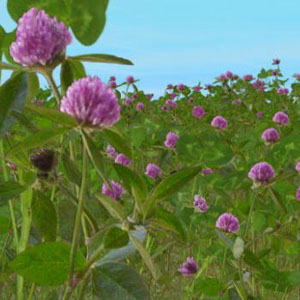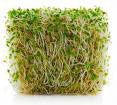| Share |  |
 | |||
God's Good Herbs - Alfalfa
 Alfalfa, sometimes called the father of herbs, is a perennial herb that has been used for healing all kinds of disorders as far back as the sixth century beginning with the ancient Greeks. It was first discovered by the Arabs who claimed it made their horses swift and strong. For this reason, they named it AL-FAL-FA which meant "father of all foods." The nutrient content of alfalfa is one of the richest known. Its deep roots often go 20 to 30 feet into the ground, picking up minerals and water inaccessible to most plants, making it the greatest land source of trace minerals.
Alfalfa, sometimes called the father of herbs, is a perennial herb that has been used for healing all kinds of disorders as far back as the sixth century beginning with the ancient Greeks. It was first discovered by the Arabs who claimed it made their horses swift and strong. For this reason, they named it AL-FAL-FA which meant "father of all foods." The nutrient content of alfalfa is one of the richest known. Its deep roots often go 20 to 30 feet into the ground, picking up minerals and water inaccessible to most plants, making it the greatest land source of trace minerals.
The leaves of alfalfa plants are especially rich in calcium, magnesium, manganese, potassium, phosphorus, iron and zinc in their most digestible forms. They also contain eight essential amino acids as well as flavones, isoflavones, sterols and coumarin derivatives. Alfalfa is a powerhouse of other vitamins and nutrients such as Vitamin A in the form of beta carotene, vitamins B1, B6, and B12, vitamin C, vitamin D, vitamin E, vitamin K and vitamin U, essential fatty acids, antioxidants, and other phytonutrients. The plant is grown commercially as a source of chlorophyll and carotene, both of which have proven health benefits. In addition, alfalfa contains eight key enzymes that act to assimilate foods in the body. Alfalfa is also higher in protein than beef, eggs or milk.
Health Benefits of Alfalfa
Alfalfa has a long list of medicinal and dietary uses. It was first used by the Chinese to treat kidney and bladder stones and relieve fluid retention and swelling. Due to its high enzyme and fiber content, it has been known to improve the digestion and assimilation of foods. Its antibacterial, antioxidant and antifungal properties along with its vitamin U content have also helped in the healing of gastritis and intestinal ulcers. Alfalfa's high chlorophyll levels make it a good blood purifier, which aids in alkalizing and detoxifying the body, especially the liver. It is also known for increasing energy levels and for being a natural appetite stimulant, diuretic and laxative.
 Its high degree of alkalinity combats thick acidic blood linked with various degenerative conditions including heart disease, high blood pressure, cancer, and arthritis. Alfalfa supplementation has been known to reduce LDL cholesterol levels. In animal studies, its saponins inhibited increases in blood cholesterol levels by 25%. It seems that fibers and certain chemicals in alfalfa leaves stick to cholesterol preventing it from remaining in the blood and depositing on blood vessel walls. Alfalfa also has been known to have a lowering effect on blood sugar, which may increase the effectiveness of medications used for the treatment of diabetes.
Its high degree of alkalinity combats thick acidic blood linked with various degenerative conditions including heart disease, high blood pressure, cancer, and arthritis. Alfalfa supplementation has been known to reduce LDL cholesterol levels. In animal studies, its saponins inhibited increases in blood cholesterol levels by 25%. It seems that fibers and certain chemicals in alfalfa leaves stick to cholesterol preventing it from remaining in the blood and depositing on blood vessel walls. Alfalfa also has been known to have a lowering effect on blood sugar, which may increase the effectiveness of medications used for the treatment of diabetes.
Alfalfa Use Precautions
Because alfalfa contains large amounts of vitamin K, a substance that promotes blood clotting, it can interfere with the blood thinning effects of aspirin. Therefore, it should not be used in large amounts when aspirin or any anti-clotting medication is being taken on a regular basis. Regular daily consumption of alfalfa is not recommended for pregnant women as it can cause uterine muscles to tighten, potentially contributing to miscarriage or early labor. Since it is known to be an immune system builder, it should not be taken by people with autoimmune diseases such as lupus or rheumatoid arthritis.
Forms of Alfalfa
Although dried alfalfa leaf is available as a bulk herb, it is more commonly taken as an herbal supplement tablet or capsule containing powdered alfalfa. It is also available in highly concentrated liquid extract or tincture that may be added to tea, juice or water. Alfalfa tea may also be made by pouring boiling water over one to two teaspoons of dried alfalfa leaves and steeping for ten minutes. No therapeutic amount of alfalfa has been clearly established for humans. It is advisable to follow the recommendations of the manufacturer on the label or your doctor concerning amounts to consume.
Alfalfa Sprouts
 A great way to obtain the high nutrient benefits of alfalfa is to eat alfalfa sprouts added to salads and sandwiches or to consume juice made from the sprouts. Alfalfa sprouts are readily available at health food stores or the produce section of most supermarkets. Choose sprouts that are fresh, crisp, clean, and moist with no signs of yellowing or rotting. Keep them refrigerated and eat as fresh as possible, using them within four or five days. Rinse your alfalfa sprouts thoroughly with water before juicing. Due to some rare incidents of bacterial contamination with sprouts, the FDA issued an advisory indicating that children, the elderly, and people with compromised immune systems should avoid eating them.
A great way to obtain the high nutrient benefits of alfalfa is to eat alfalfa sprouts added to salads and sandwiches or to consume juice made from the sprouts. Alfalfa sprouts are readily available at health food stores or the produce section of most supermarkets. Choose sprouts that are fresh, crisp, clean, and moist with no signs of yellowing or rotting. Keep them refrigerated and eat as fresh as possible, using them within four or five days. Rinse your alfalfa sprouts thoroughly with water before juicing. Due to some rare incidents of bacterial contamination with sprouts, the FDA issued an advisory indicating that children, the elderly, and people with compromised immune systems should avoid eating them.
Grow Your Own!
One way to ensure the sprouts you consume are fresh and uncontaminated is to grow your own, which is a relatively easy process. Alfalfa seeds are soaked in water overnight, then rinsed and drained twice a day for 4-6 days until grown. Here are a couple of website links for more detailed instructions on how to grow alfalfa sprouts - http://www.i4at.org/lib2/sprouts.htm or http://www.backyardnature.net/simple/alf-spr.htm Growing sprouts, especially during cold weather months when fresh green produce is less available, is a wonderful way to obtain the vital, live nutrients alfalfa offers in a concentrated form that will give your immune system an added boost.
Copyright © 2008-2015 Lucinda Bedogne, CNHP, CNC
Reader Comments...
| 2011-09-22 09:24:24 "The business loans are important for guys, which are willing to organize their company. In fact, it's very easy to get a auto loan. " - Debbie |
| 2011-09-21 11:19:59 "The loans are useful for guys, which want to ground their business. By the way, this is not hard to receive a financial loan. " - Kate |
Post Your Comment...
|
|
||||||||||||


